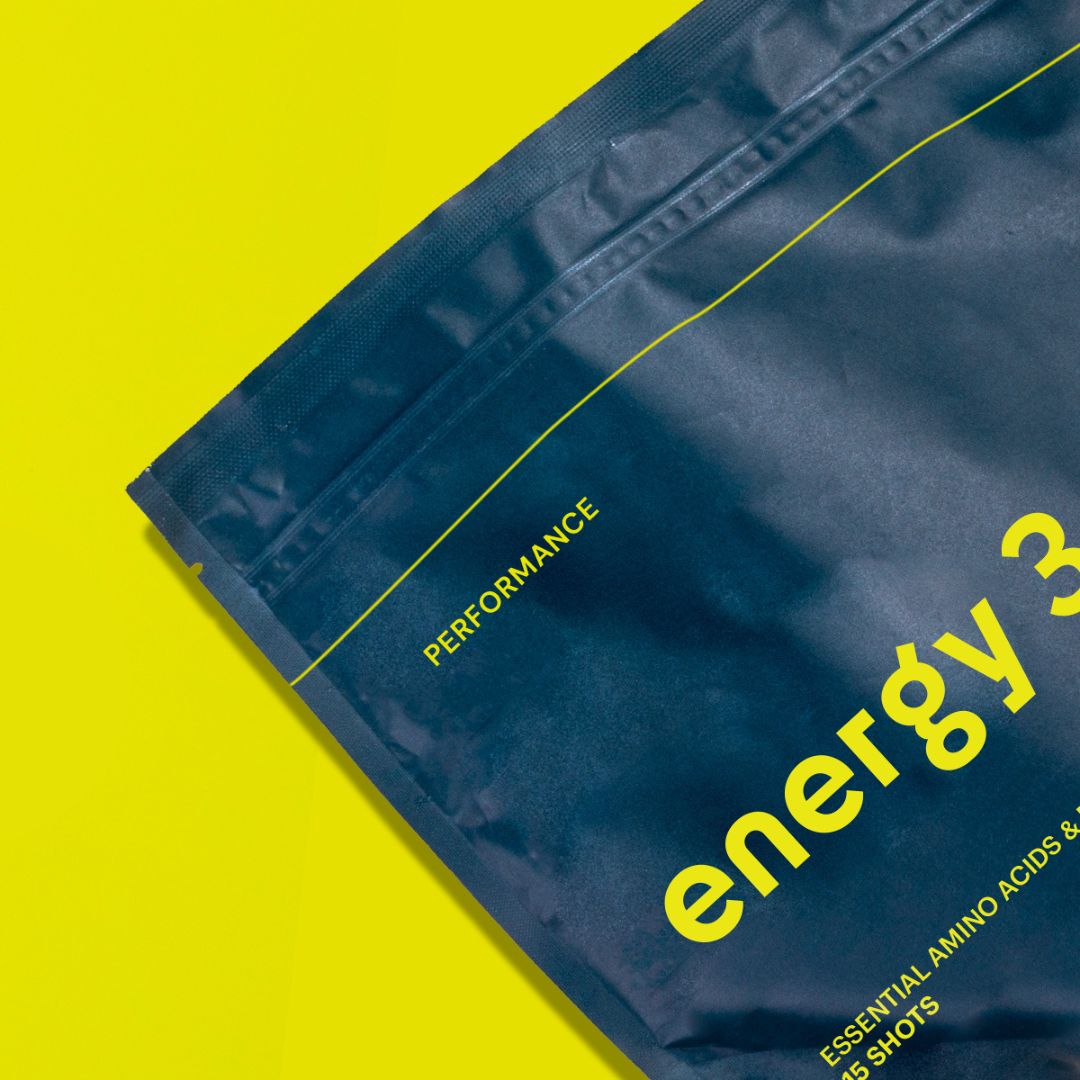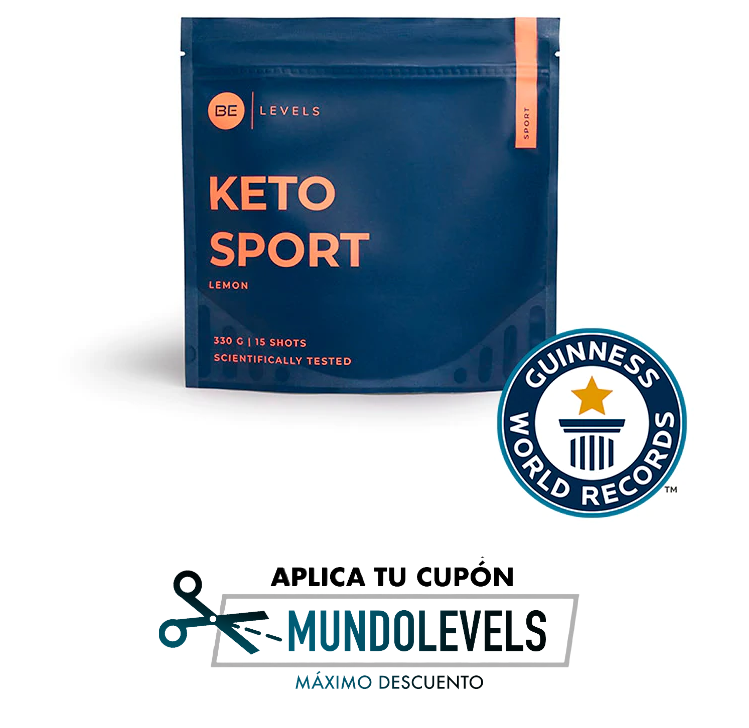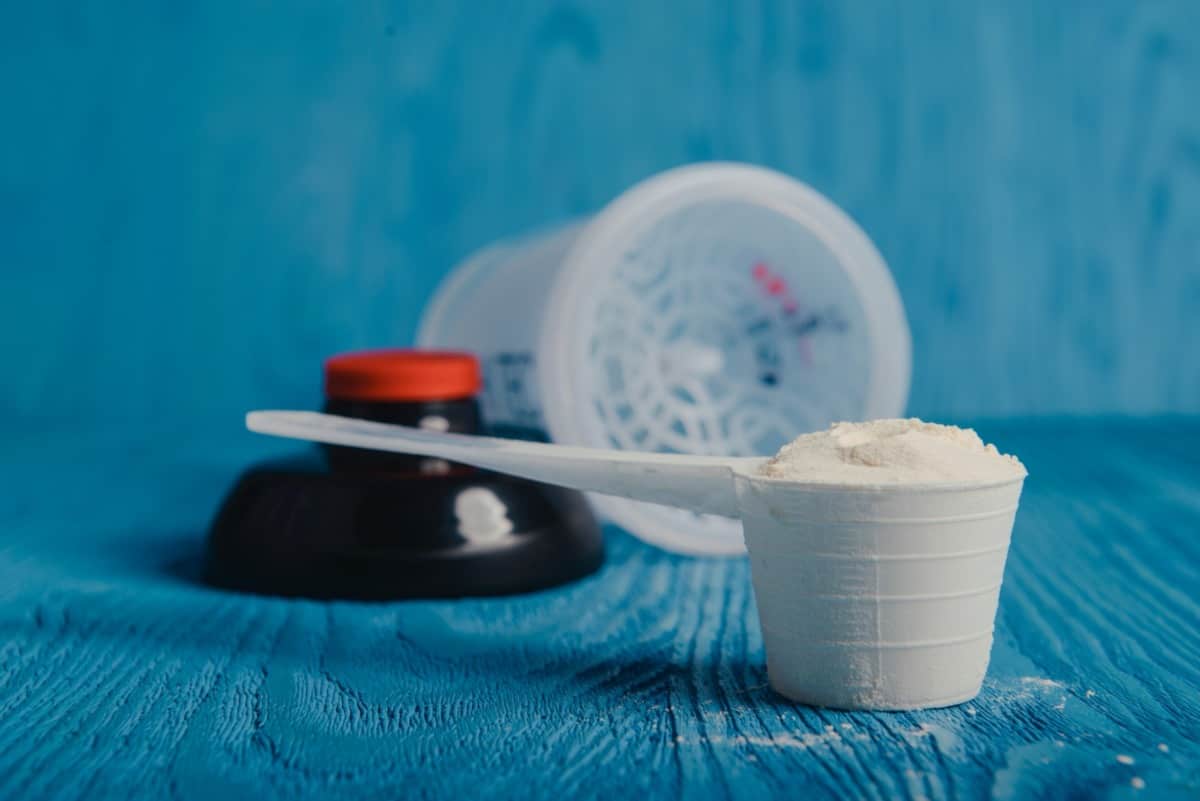The best sports supplements available today are numerous, each with their respective functions or effects.
However, although it may seem strange, few have been shown to have an ergogenic effect on the body or athletic performance.
In this article, we will argue the effects of the 5 best sports supplements with the most scientific evidence. These are: protein, Creatine, Caffeine, HMB, and Beta-Alanine.
If you are looking for a supplement different from those mentioned above and that gives you an extra boost of energy in all your workouts, we recommend Energy 3 from Be Levels.
- Máxima energía durante todo el entrenamiento o actividad deportiva
Una formulación única en el mercado de la suplementación deportiva ha llegado para garantizar tu energía durante los entrenamientos o competiciones deportivas. Dirigido a las personas más exigentes con sus disciplinas deportivas. Ideal para esfuerzos de alta intensidad o larga duración.
A unique formulation in the sports supplementation market has arrived to guarantee your energy during training or sports competitions. Aimed at the most demanding people with their sports disciplines. Ideal for high-intensity or long-duration efforts.
Best sports supplements: protein
The consumption of protein as one of these sports supplements has always been in the spotlight of those who, for various reasons, want to see their strength and muscle mass increased.
The truth is that the latest research recommends, for a significant improvement in muscle hypertrophy, between 1.4 and 2.0 grams of protein per kilogram of body weight (1.2-2.0 g/kg) should be consumed (1).
Within the group of macronutrients we know as proteins, we can find different groups: animal origin proteins, plant-based… and although all favor protein synthesis, we must consider two fundamental aspects to discover which of these groups can benefit us the most (1).
Below we show you another ideal supplement for athletes: Keto Sport from Be Levels: Drink for your high-performance Keto workouts.
Your perfect ally for sports and activities in environments where you seek energy efficiency using fats as a source of lasting energy.
Ideal for starting your training sessions avoiding ingrained carbohydrate and sugar loads. You can purchase it with maximum discount by applying the coupon “MundoLevels”.
Types of protein
Firstly, within protein supplements, we must consider two aspects:
The biological value, which explains the efficiency with which the consumed protein leads to protein synthesis in the tissues once absorbed (it has a maximum value of 100) and digestibility, which lists its content in essential amino acids (it has a maximum value of 1.0) (2).
These two scales are important for understanding the bioavailability and quality of different protein sources (2).
Regarding protein supplementation, the dairy source is the most used, with its 3 branches: cow’s milk, casein, and whey (2).
Bovine milk has a Biological Value of 91 and a digestibility of 1.00. This indicates that it is easily absorbed in the body.
Casein has a Biological Value of 77 and a digestibility of 1.00, it is the predominant protein in bovine milk and gives milk its white color (2).
Whey has a Biological Value of 104 and a digestibility of 1.00. As we can see, this last one is superior to both the BV of milk and casein.
Additionally, it contains all essential amino acids and its excellent bioavailability leads to rapid protein synthesis in the body (2,3).
Ergogenic effects of protein
After reviewing numerous articles (4,6), it has been shown that the intake of protein sports supplements before and after strength training is vital for achieving increases in muscle mass.
Although improvements have also been found when ingested in the morning and at night (5).
In summary, it has been shown that protein intake before and after strength training causes, in addition to the increase in muscle mass, the following effects:
- Physical performance (4,7).
- Recovery from the training session (8).
- Lean body mass (5,7).
- Muscle hypertrophy (6,7).
- Muscle strength (4,5,7).
Sports supplements: creatine
Creatine supplementation (SCr) began in the 90s after the high level achieved by strength and speed athletes at the Barcelona Olympic Games in 1992 (9).
Today, creatine is one of the most used sports supplements in the world (10). It is one of the sports supplements that is not considered a doping substance (11).
Creatine is a compound created in the body from certain amino acids present in the diet, where it is mostly stored in the muscle as phosphocreatine (PCr) (12).
It is this increase in total creatine in the muscle through creatine sports supplements (SCr) that generates an ergogenic effect by improving ATP resynthesis during high-intensity exercise and recovery (13).
The goal of this intake is to improve the ability to produce energy during explosive actions and high-intensity movements, as well as to recover faster after performing this intense exercise (14,15).
Ergogenic effects of creatine
Most studies investigating creatine supplementation have shown increases in strength, power, speed, and the total amount of work done at high intensity (11).
Some examples would be weightlifting and bodybuilding athletes (11) or sprinters (16).
Sports supplements: caffeine
Caffeine is also recognized as one of the most scientifically supported sports supplements, as several studies show that it can help enhance athletic performance (17, 18).
Caffeine, which is present in many foods like coffee, chocolate, or tea, is consumed worldwide, reflecting a great acceptance for its consumption in the sports field (18).
Like creatine, caffeine is not classified as a doping substance within sports supplements (19).
Ergogenic effects of caffeine
The effects of caffeine in sports are demonstrated in both aerobic endurance activities and high-intensity, short-duration ones (18,20).
In the former, caffeine causes fat mobilization due to an increase in adrenaline levels, resulting in a delay in the use of the body’s carbohydrates (18,20).
In the latter, caffeine improves the propagation of nerve impulses and acts on the affinity of myofilaments for calcium (18,20,21).
We must highlight that in both activities, caffeine directly influences the central nervous system, reducing the sensation of effort (18,21).
Caffeine: recommended dose and side effects
This will depend on each person and the sport they practice, although the recommended dose, in general sports levels, would be between 3 and 9 mg/kg of body weight (22,23).
Doses of 4 mg/kg have been shown to have effects on aerobic performance, and their intake should be about an hour before sports practice (21).
Excessive and continuous consumption over time could lead to toxicity in the body, gastrointestinal problems, insomnia, irritability, body temperature regulation issues, and tachycardia (18,22,23).
Below, we present a caffeine-based supplement with ideal ingredients to take as a pre-workout and increase physical performance.
Sports supplements: HMB
Next, we analyze HMB
What is HMB
HMB (β-hydroxy-β-methylbutyrate) is a metabolite of L-leucine. HMB sports supplements have been shown to reduce muscle damage after intense exercise (24).
From here, a hypothesis has been generated where HMB may be responsible for the inhibitory effect on protein degradation during high-intensity physical exercise (25).
Ergogenic effects of HMB
Among the ergogenic effects attributed to HMB in sports or exercises with high muscle impact (strength), we find:
- Reduction of muscle damage during exercise (26).
- Decrease in CPK production (25).
- Modulation of enzymes responsible for muscle catabolism such as cortisol, testosterone, or insulin (27,28).
- Doses of 3 mg/kg of body weight have shown the most benefits (28).
- Increase in muscle mass and strength (29).
Among the ergogenic effects attributed to HMB in sports or exercises related to enduring a load for a prolonged period (endurance), we find:
- Longer time to reach maximum oxygen consumption (30).
- Decrease in PFK activity in endurance tests (31).
Sports supplements: beta-alanine
Now we will analyze beta-alanine.
What is beta-alanine?
Beta-alanine is an amino acid produced in the liver. The main aspect of using beta-alanine sports supplements is that they limit carnosine synthesis in the muscle (32,33).
Scientific studies have shown that in strength sports and high-intensity exercises, higher concentrations of carnosine are reached in the muscle (34,35).
The role of carnosine is as an intracellular “buffer” (36), and it has also been shown to act as a natural antioxidant, eliminating free radicals (37), which reduces oxidative stress.
Ergogenic effects of beta-alanine
Supplementation with beta-alanine helps in explosive and high-intensity sports because it increases carnosine concentrations in the muscle (38,39).
In a very comprehensive review (39), it was indicated that beta-alanine could improve performance in exercises lasting 60 to 240 seconds, but not in those shorter than 60 seconds.
On the other hand, for activities lasting more than 4 minutes, where the energy demand comes from the aerobic pathway, supplementation with beta-alanine is not recommended (40).
Beta-alanine: recommended dose and side effects
To date, research suggests that a dose of 4-6 g/day of beta-alanine divided into 2 doses over 4 weeks could increase muscle carnosine levels by 40-60% (41).
Paresthesia (tingling sensation) is the major side effect of beta-alanine supplementation and is common in subjects taking doses higher than 800 mg in non-sustained release formulas (32).
This paresthesia usually disappears 45-60 minutes after ingestion and is greatly reduced when sustained-release formulas are taken (41).
Bibliography
- Gropper, S; Smith, J; Groff, J. (2009): Protein. In Advanced Nutrition and Human Metabolism. 5th edition. California: Wadsworth Cengage Learning: 179–250.
- Hoffman, J; Falvo, M. (1997): Protein—which is best? J Sports Sci Med, 3:118–130.
- Boirie, Y; Dangin, M; Gachon, P; Vasson, M; Maubois, J; Beaufrere, B. (1997): Slow and fast dietary proteins differently modulate postprandial accretion. Natl. Acad. Sci, 94:14930–14935.
- Hoffman, J; Ratamess, N; Tranchina, C; Rashti, S; Faigenbaum, A. (2009): Effect of protein-supplement timing on strength, power, and body-composition changes in resistance-trained men. J. Sport. Nutr. Exerc. Metab, 19(2):172–185.
- Cribb, P; Hayes, A. (2006): Effects of supplement timing and resistance exercise on skeletal muscle hypertrophy. Sci. Sports. Exerc, 38(11):1918–1925.
- Hulmi, J; Koyanen, V; Selanne, H; Kraemer, W; Hakkinen, K; Mero, A. (2009): Acute and long-term effects of resistance exercise with or without protein ingestion on muscle hypertrophy and gene expression. Amino Acids, 37:297–308.
- Hartman, J; Tang, J; Wilkinson, S; Tarnopolsky, M; Lawrence, R; Fullerton, A; Phillips, S. (2007): Consumption of fat-free fluid milk after resistance exercise promotes greater lean mass accretion than does consumption of soy or carbohydrate in young, novice, male weightlifters. J. Clin. Nutr, 86(2):373–381.
- Hoffman, J; Ratamess, N; Tranchina, C; Rashti, S; Kang, J; Fiagenbaum, A. (2010): Effects of a proprietary protein supplement on recovery indices following resistance exercise in strength/power athletes. Amino Acids, 38:771–778.
- Anderson, O. (1993) Creatine propels British athletes to Olympic gold medals: Is creatine the one true ergogenic aid? Running Research News 9: 1-5.
- Williams, M.H., Kreider, R.B. and Branch, J.D. (1999) Creatine: The Power Supplement. Human Kinetics, Champaign, IL.
- Bird, S. P. (2003): Creatine supplementation and exercise performance: A brief review. Journal of Sports Science and Medicine. 2: 123-132.
- Wyss, M. and Kaddurah-Daouk, R. (2000) Creatine and creatinine metabolism. Physiological Reviews. 80: 1107-1213.
- Snow, R.J., McKenna, M.J., Selig, S.E., Kemp, J., Stathis, C.G. and Zhao, S. (1998) Effect of creatine supplementation on sprint exercise performance and muscle metabolism. Journal of Applied 84: 1667-1673.
- McKenna, M.J., Morton, J., Selig, S.E. and Snow, R.J. (1999) Creatine supplementation increases muscle total creatine but not maximal intermittent exercise performance Journal of Applied Physiology. 87: 2244-2252.
- Stout, J., Eckerson, J., Ebersole, K., Moore, G., Perry, S., Housh, T., Bull, A., Cramer, J. and Batheja, A. (2000) Effect of creatine loading on neuromuscular fatigue threshold. Journal of Applied Physiology. 88: 109-112.
- Meir, R. (1995) Practical application of oral creatine supplementation in professional rugby league: A case study. Australian Strength and Conditioning 3:6-10.
- Caviglia, E. L. (2010). Effects of caffeine intake on the performance of soccer players. Retrieved on 22/03/2015.
- González-Jurado, J. A. (2005). Ergogenic aids: Substances that can improve athletic performance. Retrieved on 21/03/2015.
- World Anti-Doping Agency (2015). List of prohibited substances and methods. Retrieved on 22/03/2015.
- Maynar-Mariño, M.; Olcina-Camacho, G.; Muñoz-Marín, D.; Ávila-Fernández, P. & Timón-Andrada, R. (2003). Effects of caffeine on maximum aerobic and anaerobic parameters. Apunts Medicina del Deporte. 141, 5 -8.
- Pérez-Barroso, A. (2005). Ergogenic aids in athletes. Retrieved on 21/03/2015.
- Onzari, M.; Krupitzky, H.; Cillo, F. & Cámera, K. (2010). Caffeine consumption in athletes. Retrieved on 22/03/2015.
- Ramírez-Montes, C. & Osorio, J. (2013). Use of caffeine in physical exercise: advantages and risks. Revista de la Facultad de Medicina. 61(4), 459 – 468.
- Nissen SL, Sharp RL. (2003). Effect of dietary supplements on lean mass and strength gains with resistance exercise: a metaanalysis. J Appl Physiol. 94(2): 651–659.
- Nissen SL, Abumrad NN. (1997). Nutritional role of the leucine metabolite b-hydroxy-b-methylbutyrate (HMB). J Nutr Biochem. 8: 300–311.
- Vukovich MD, Slater G, Macchi MB et al. (2001). Beta-Hydroxy-betamethylbutyrate (HMB) kinetics and the influence of glucose ingestion in humans. J Nutr Biochem. 12: 631–639.
- Slater GJ, Jenkins D. (2000). Beta-hydroxy-beta-methylbutyrate (HMB) supplementation and the promotion of muscle growth and strength. Sports Med 30: 105–116.
- Jowko E, Ostaszewski P, Jank M. (2001). Creatine and b-hydroxy-bmethylbutyrate (HMB) additively increase lean body mass and muscle strength during a weight-training program. 17: 558–566.
- Zanchi NE, Filho MA, Felitti V, Nicastro H, Lorenzeti FM, Lancha AH Jr. (2010). Glucocorticoids: extensive physiological actions modulated through multiple mechanisms of gene regulation. J Cell Physiol. 224: 311–315.
- Vukovich MD & Adams GD. (1997). Effect of b-hydroxy-b-methylbutyrate (HMB) on VO2 peak and maximal lactate in endurance trained cyclists (Abstract). Med Sci Sports Exerc. 29:
- Knitter AE, Panton L, Rathmacher JA et al. (2000). Effects of betahydroxy- beta-methylbutyrate on muscle damage after a prolonged run. J Appl Physiol. 89: 1340–1344.
- Harris RC, Tallon MJ, Dunnett M, Boobis L, Coakley J, Kim HJ, et al. (2006). The absorption of orally supplied beta-alanine and its effect on muscle carnosine synthesis in human vastus lateralis. Amino Acids. 30(3):279–89.
- Dunnett M, Harris RC. (1999). Influence of oral beta-alanine and L-histidine supplementation on the carnosine content of the gluteus medius. Equine Vet J Suppl. 30:499–504.
- Tallon MJ, Harris RC, Boobis LH, Fallowfield JL, Wise JA. (2005). The carnosine content of vastus lateralis is elevated in resistance-trained bodybuilders. J Strength Cond Res. 19(4):725 –9.
- Baguet A, Everaert I, Hespel P, Petrovic M, Achten E, Derave W. (2011). A new method for non-invasive estimation of human muscle fiber type composition. PLoS One. 6(7).
- Severin SE, Kirzon MV, Kaftanova TM. (1953). Effect of carnosine and anserine on action of isolated frog muscles. Dokl Akad Nauk SSSR. 91(3):691–4
- Klebanov GI, Teselkin Yu O, Babenkova IV, Lyubitsky OB, Rebrova O, Boldyrev AA, et al. (1998). Effect of carnosine and its components on free-radical reactions. Membr Cell Biol. 12(1):89–99.
- Culbertson JY, Kreider RB, Greenwood M, Cooke M. (2010). Effects of beta-alanine on muscle carnosine and exercise performance: a review of the current literature. 2(1):75–98.
- Skulachev VP. (2000). Biological role of carnosine in the functioning of excitable tissues. Centenary of Gulewitsch’s discovery. 65(7):749–50.
- Hobson RM, Saunders B, Ball G, Harris RC, Sale C. (2012). Effects of beta-alanine supplementation on exercise performance: a meta-analysis. Amino Acids. 43(1):25–37.
- Stellingwerff T, Anwander H, Egger A, Buehler T, Kreis R, Decombaz J, et al. (2012). Effect of two beta-alanine dosing protocols on muscle carnosine synthesis and washout. Amino Acids. 42(6):2461–72.






